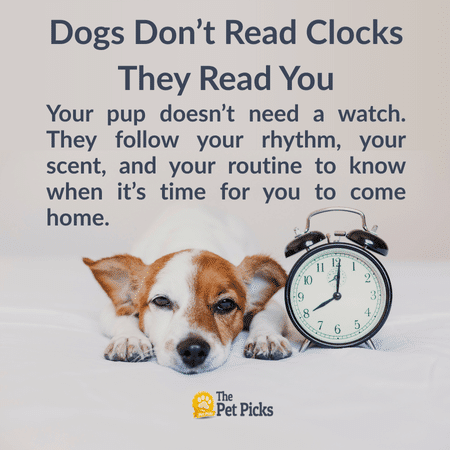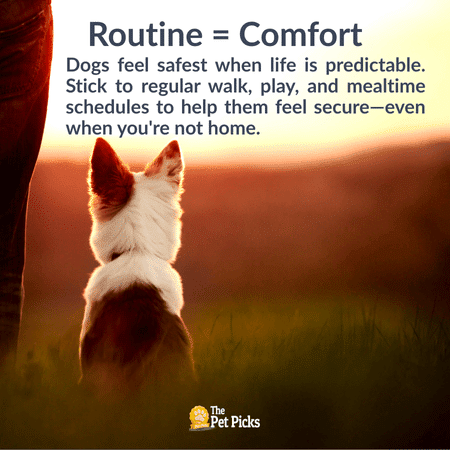Is Your Dog Psychic—Or Just Great at Reading Time?
You come home at 5:30 PM, and like clockwork, your dog is waiting by the door. No phone call, no footsteps, no doorbell. Just your dog… ready, excited, and somehow always right on time.
So what gives? Can dogs actually tell time? Or is something deeper going on?
At ThePetPicks.com, we believe understanding your dog’s inner world brings us closer. That’s why we explored the science behind your pup’s uncanny time-tracking abilities—from scent tracking to biological rhythms—to answer the question every pet parent asks: How does my dog always know?
The Rhythm of the Pack: How Dogs Use Their Internal Clock
Just like us, dogs operate on a circadian rhythm—a natural internal clock that regulates their sleep-wake cycles, hormone levels, and activity patterns.
This rhythm helps them anticipate daily events like feeding times, walks, and your return home. Over time, their bodies adjust to your routine. Your morning coffee? Their tail wags. Your shoes going on? It’s game time.
But there’s more to it than just routine. Scientists have discovered that dogs can develop time-based associative memory. This means they link certain events—like the sun setting or a shift in household noise—with what usually happens next, like your arrival from work.
Their rhythm isn’t just biological—it’s emotional. Dogs feel the passage of time in your absence, not through ticking seconds but through changes in their environment and bodies.

Follow Your Nose: How Scent Tells Dogs What Time It Is
One of the most fascinating—and heart-melting—theories is that dogs literally smell time. That’s right—scent is time’s perfume, and your dog is the ultimate sniffer.
Here’s how it works: your scent doesn’t just linger in your home—it fades. As the hours pass after you leave, your unique scent molecules gradually dissipate. According to animal behavior researchers, dogs may learn to associate the strength—or weakness—of your scent with how long you’ve been gone.
So when your pup starts pacing near the door or curling up by the window around the same time each day, it’s not because they read the clock. They’re using their nose to measure time.
It’s like their own version of a scented hourglass, and it’s one more way they’re silently bonding with you, even when you’re away.
Environmental Cues: When Routine Becomes a Sixth Sense
Have you ever noticed that your dog gets antsy before dinner or starts circling the door before your evening walk—sometimes even when you're running late?
That’s because dogs are expert observers. They pick up on environmental patterns and changes in your behavior with an accuracy most of us miss. The changing light through the window, the noise of a school bus, the hum of the heater turning on—they all serve as cues that help your dog track time.
Over time, your dog becomes a master of your patterns. Not because they “understand” time, but because they understand you. They’ve mapped out your rhythms and behaviors in a way that’s hardwired to their memory.
To your dog, it’s not 6:00 PM. It’s “the time the living room gets quieter and my human walks through the door.”

Why Your Absence Feels Longer to Them Than to You
Here’s the emotional part—and if you’ve ever worried about leaving your dog home alone, this matters.
Studies suggest that dogs feel longer periods of absence more intensely. One experiment showed that dogs greeted their owners with more excitement after two hours than after 30 minutes, and even more after four hours.
Why? Because dogs don’t just register time passing—they miss you in real-time. While they can predict your return based on cues, that doesn’t mean they don’t feel your absence. Their joy when you walk in the door isn’t just routine—it’s relief, love, and connection.
So yes, dogs may “tell time” in their own way. But it’s powered by emotion. Your presence is comforting. Your absence is noticed. And your return? It’s the best part of their day.
Training Tips for Time-Aware Dogs (and Their Humans)
Now that we understand how dogs experience time, here are a few things to keep in mind to make their day—even when you’re away—a little easier:
Stick to Routines
Dogs thrive on structure. Try to keep feeding, walking, and play times consistent—even on weekends. Predictability lowers anxiety.
Use Scent to Comfort
Leave behind something that smells like you: a worn t-shirt or blanket can help soothe separation anxiety and reinforce their time-scent tracking.
Provide Stimulating Distractions
Toys that engage their brains, like treat puzzles or slow feeders, can make time pass more quickly while you're gone.
Create Environmental Cues
Dogs rely on sights, sounds, and smells. Consider using calming music, automatic feeders, or scheduled lighting to create familiar cues.

The Time-Tested Bond Between Dogs and Humans
So, can dogs tell time?
Not the way we do. They don’t check the clock. But through scent, rhythm, memory, and deep emotional connection, they experience time with us—even when we’re not there.
At ThePetPicks.com, we’re not just here to help you find the best food, beds, or DNA kits. We’re here to help you understand your pet better—because the more you know, the stronger your bond becomes.
After all, when your dog’s entire day revolves around the moment you return, that’s not just a habit. That’s love.
FAQs
How do dogs know when it's time to eat or go for a walk?
Dogs rely on circadian rhythms, environmental cues, and consistent routines. They learn to associate certain times of day with specific activities—and often remind us when we forget!
Can dogs really smell how long we've been gone?
Yes, studies suggest dogs can use the strength and decay of your scent to gauge how long you’ve been away, especially if the routine is consistent.
Do dogs miss us more the longer we’re gone?
Research shows dogs do respond more strongly after longer absences, indicating they feel your absence emotionally and not just as a routine disruption.
Should I worry about leaving my dog home alone for long hours?
While many dogs can adjust, long periods of isolation can lead to stress. Consider pet sitters, doggy daycare, or comfort items that smell like you to ease anxiety.
Can you train a dog to understand time better?
You can’t teach a dog to read a clock, but you can help them feel more secure with routines, scheduled feeding, and consistent behavioral cues.
A Loving Reminder
The information provided at ThePetPicks.com is based on research and expertise, aiming to enhance the bond between you and your dog. However, it’s essential to remember that every dog is unique. Always consult with professionals, like veterinarians or trainers, for specific concerns or advice. At ThePetPicks.com, we believe in “Trust Born from Love,” and we encourage every pet parent to make informed decisions rooted in love and care.

